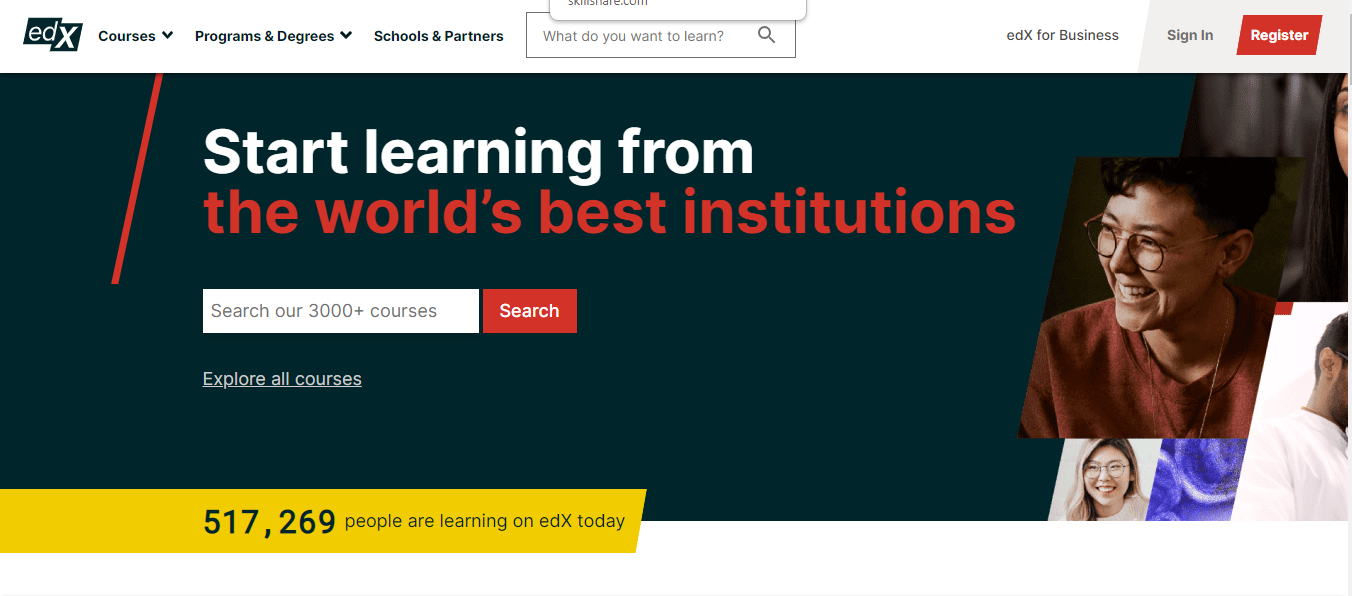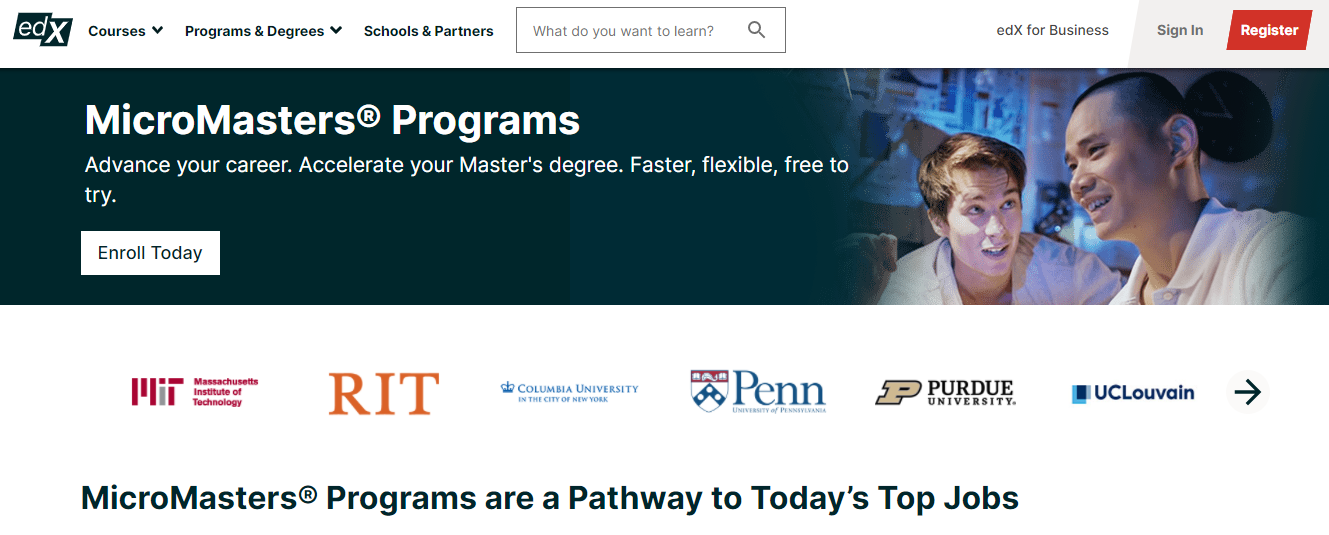Projections are that by 2025, the Massive Open Online Course (MOOC) market could surpass $325 billion worth of revenue. And chances are, Coursera, Udemy and edX are going to play a big role in that.
While Coursera and edX may be better for higher education courses, Udemy has the upper hand in the number of overall classes. However, that’s not all there is to know about these sites. In this detailed comparison, we take you through everything you need to know to decide where to sign up.
Table of Contents
Coursera, Udemy or edX: The Pros & Cons
Coursera
Pros
- High-Quality Content. Coursera partners with top universities, organizations, and other important educational institutions. This means the courses are of high quality and come from reliable sources.
- Relevant Skills. There are plenty of new courses covering the latest in-demand jobs across different industries.
- Wide Selection. Coursera has over 4,000 courses available for you to choose from.
- Affordable Pricing. Many of Coursera’s courses are very affordable – you can get a professional Coursera certificate for as little as $39.
Cons
- Date-Specific Courses. Some courses are only available on specific dates. This means you may have to wait a few weeks to enroll in a course.
- Fewer Free Courses. There was a time when you could enroll in almost any Coursera course for free. But the platform seems to offer fewer free courses now.
- Not All Beginner Courses Are Beginner-Friendly. Some beginner courses require prior field knowledge, even though the description says they’re suitable for beginners.
Udemy
Pros
- Wide Selection of Free Courses. Udemy offers plenty of free courses on a variety of topics.
- Money-Back Policy. There is a 30-day money-back guarantee for all courses purchased on the platform.
- Lifetime Access. You get lifetime access to the course material.
- Most Courses on Offer. Out of the three platforms, Udemy has the most extensive selection. There are over 180,000 courses across 13 categories.
Cons
- Non-Accredited Certificates. All certificates on Udemy are non-accredited, which means they don’t necessarily carry as much weight.
- Unpredictable Course Quality. Since anyone can create courses on Udemy, the quality of the courses is not always consistent.
- Inconsistent Pricing. The same course can cost $9.99 one day and $199 on another.
edX
Pros
- Accredited Certificates. edX partners with some of the world’s top universities and offers accredited certificates and qualifications.
- Generous Refund Policy. When you purchase a verified course on edX, you’re eligible for a 14-day refund if you’re not satisfied with the course.
- Free Course Auditing. One of the best things about edX is that you can follow many courses for free. You won’t be eligible for a certificate or receive assignments, but you get all the knowledge.
Cons
- Mostly Science-Oriented. Even though edX offers several different course categories, they are still mainly oriented towards science and programming.
- Course Inconsistency. If you plan on signing up for different courses, don’t expect them to have a consistent structure. Course creators have the freedom to organize the course any way they like, so don’t expect the same structure every time.
- Lack of Peer Interaction. If you’re a fan of Coursera’s forum discussions, you may be disappointed by the lack of peer-to-peer interactions on edX.
Coursera, Udemy or edX: Types of Courses Offered
Coursera

Coursera has plenty of courses on a variety of topics. The site’s catalog is split into 11 categories:
- Business
- Computer Science
- Data Science
- Health
- Information Technology
- Language Learning
- Personal Development
- Social Sciences
- Art and Humanities
- Math and Logic
- Physical Science and Engineering
In total, the platform is home to over 4,000 courses. Other than the variety of categories, Coursera students can also choose between flexible learning plans:
- Guided Projects are designed as short courses you can complete in a couple of hours.
- Specializations are more thorough and better for mastering specific skills.
- Professional certificates prepare students for jobs and are often recognized by organizations and schools.
- MasterTrack and Degrees programs count towards university credit, while the latter enables students to obtain a Bachelor’s and Master’s degree online.

If you’re into continuous casual learning, you can sign up for Coursera Plus, the platform’s subscription plan that grants access to over 90% of their learning program. Take as many courses as you want and earn a Course Certificate for each completed course.
Is Coursera Accredited?
Yes, some courses offered on Coursera are accredited. The platform partners with over 200 universities worldwide like Barkley, Stanford, Imperial College London, Yale, and others. Their certificates are verified, and some courses even count towards college credits and let you obtain a university degree.
Udemy

Udemy is the platform with the highest number of courses compared to the other two featured in this review. They have over 250,000 programs on just about any topic.
Udemy courses are available across the following categories:
- Business
- Development
- Finance and Accounting
- Office Productivity
- IT and Software
- Design
- Marketing
- Photography and Video
- Lifestyle
- Health and Fitness
- Personal Development
- Teaching and Academics
- Music

Due to the many available courses, the platform has a comprehensive filtering system. Filter your search according to proficiency level, duration, price, language, student feedback, and more. Students can also choose between free and paid courses, although the free options are mainly related to programming and animation.
Is Udemy Accredited?
No, Udemy doesn’t offer accredited courses. Universities and organizations don’t necessarily recognize the certificate either. If you are entering the workforce or want to move up in an organization, an accredited platform might be a better choice.
edX

edX offers over 2,000 courses from more than 160 partner universities, including Harvard, Berkeley, Massachusetts Institute of Technology, University of Texas, Boston University, and others. Their classes are sorted into 31 categories. For the sake of brevity, we’ll list 15 categories with the highest number of courses:
- Business and Management
- Computer Science
- Data Analysis & Statistics
- Economics & Finance
- Engineering
- Humanities
- Science
- Social Sciences
- Medicine
- Math
- History
- Health & Safety
- Environmental Studies
- Communication
- Biology & Life Sciences
Other subjects include architecture, chemistry, electronics, ethics, food and nutrition, law, and literature.
Students can filter courses according to category, partner, proficiency level, language, availability, and learning type. Courses are available in 25 languages, including English, Spanish, Italian, Russian, French, German, Arabic, Chinese, and more.
Other than individual paid and free courses, edX offers special programs and degrees, including:
- Online Master’s Degrees. These programs allow students to benefit from lower tuition fees, while still walking away with a recognized master’s degree.
- MicroBachelors. Provided by top university partners, these affordable courses are for adults looking to progress their careers.
- MicroMasters. These graduate-level courses from top universities are recognized by employers for job relevance.
- Professional Certificates. Receive a general accredited certificate from a leading college or university to enahnce your career or enter the working world.
- XSeries Programs. These programs focus on in-demand subjects taught by experts and top universities.

A great thing about edX is that many courses are also available for free. You just have to choose the Audit option when registering.
Is edX Accredited?
The MicroMasters and Master’s Degree programs offered by edX are accredited. Students can get university credit by completing these programs.
Coursera, Udemy or edX: Pricing & Refunds
Coursera
Some Coursera course options like Specializations are a series, while others are available for one-time fees.
Coursera prices range from $30 to $100. The main reason for the price difference is not the quality, but the differentiation strategy Coursera agreed on with its partner universities. Overall, Coursera prices are still among the most affordable.
The Coursera Plus plan is available as a monthly ($59) or annual ($399) subscription. The monthly plan comes with a seven-day free trial, while the annual plan has a 14-day money-back guarantee. You can cancel any of your memberships anytime.
Specializations run on a subscription model and cost anywhere from $30 to $80 per month. There is a seven-day trial.
The Online degree programs cost around $15,000 on average since students earn an accredited university degree upon completion.
You can request a refund for a paid individual course or for your Coursera Plus subscription within two weeks of the payment. Coursera doesn’t offer refunds to students who have already earned a Course Certificate.
Udemy
Udemy’s pricing is much more straightforward. The platform doesn’t offer any subscription services or group courses. You pay for each course individually.
The course prices range from $9.99 to $199.
Almost every Udemy review online covers the “is Udemy legit” question due to the massive discounts that are often available. The reality is, this is how Udemy works. Udemy runs the most sales out of most eLearning platforms to get more students to sign up, so take advantage while you can.
The platform also offers a 30-day money-back guarantee. Students can request refunds on the website or mobile app and receive their money back as per their original payment.
edX
Students can take any edX courses except the Professional Education, Executive Education, and Boot Camps for free, but this doesn’t include certificates and graded assignments.
The individual course price ranges between $50 and $300.
- Master’s Degree programs cost between $9,000 to $25,000 and take three years to complete.
- MicroBachelor programs cost between $200 to a few thousand dollars per course and take one year to complete.
- MicroMaster programs cost between $500 to $1,500 and take up to a year to complete.
- Professional Certificate courses cost between $200 to a few thousand dollars.
- Xseries courses cost between $200 to $600 and take around four months to complete.
If you ever wondered, “is edX free?” you now have the answer. edX isn’t one of the most affordable platforms, but it has a refund policy.
There is a 14-day refund policy available from the purchase date of the course. edX doesn’t offer refunds to students who have already received a certificate.
For program bundles, you can unenroll for a refund or change to another course session. There’s also a 14-day refund period for these courses.
The Verdict
This Coursera vs. Udemy vs. edX review has highlighted everything you should know to decide between these platforms.
Coursera and edX are a better option for those looking for more serious learning opportunities. Both platforms partner up with top universities and offer accredited courses. edX has more detailed programs and is more oriented towards science, while Coursera has a wide selection of courses covering in-demand fields.
Udemy, on the other hand, is great for anyone looking for affordable courses to upgrade or learn new skills fast. Most of their programs take up to a month or so to complete, are easy to follow, and don’t require much study time.
Overall, if you’re after a detailed, long-term course provided by top universities, edX may be your best choice. You want to give Udemy a chance for informal learning, while Coursera is the best option for those looking for something in between – a more serious approach than Udemy, but not as comprehensive as edX.
